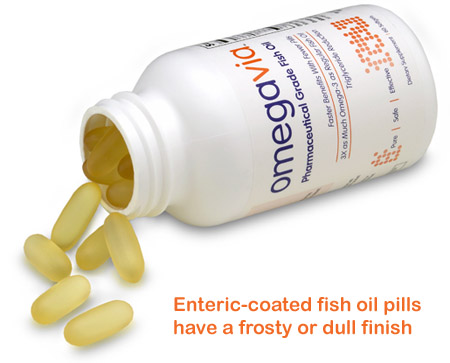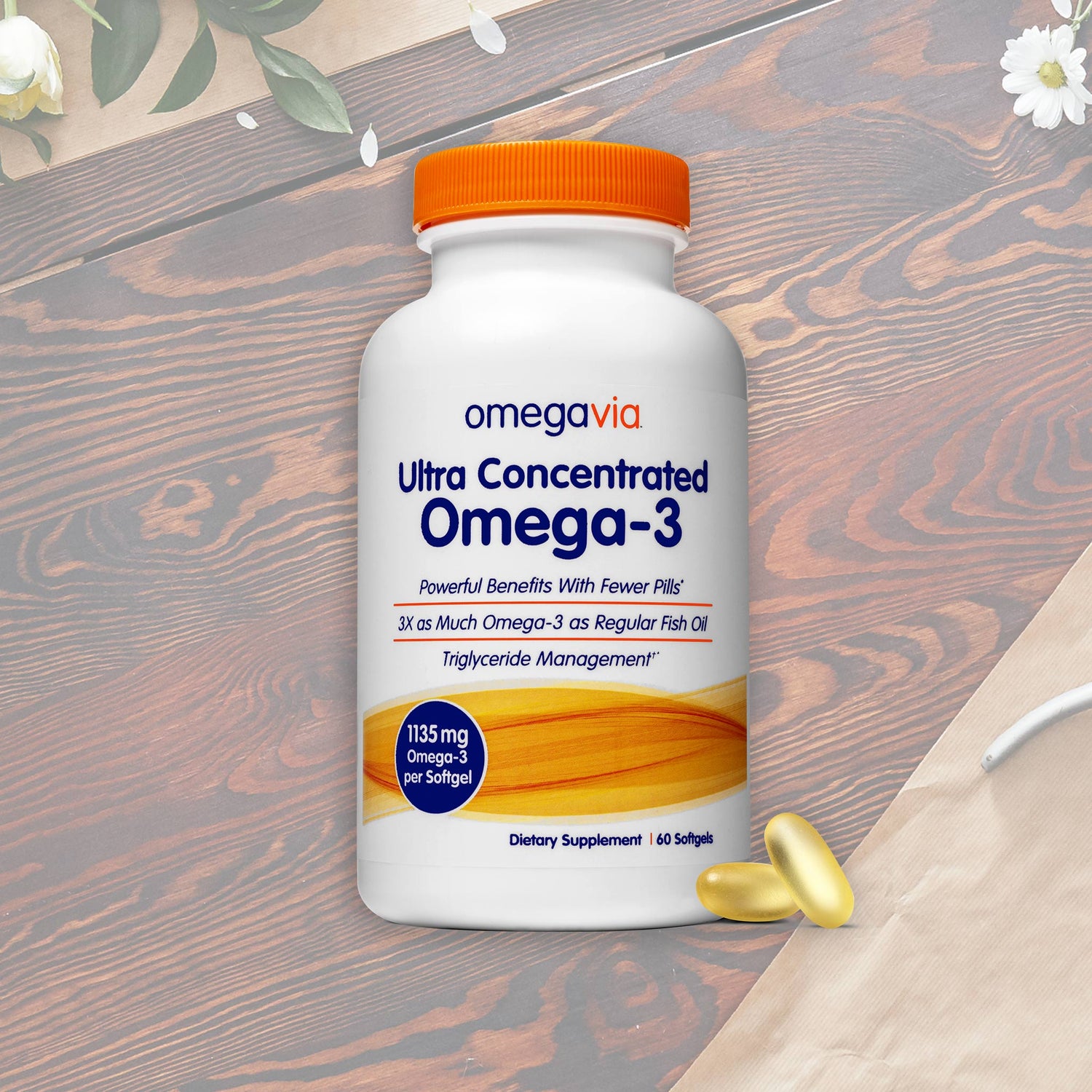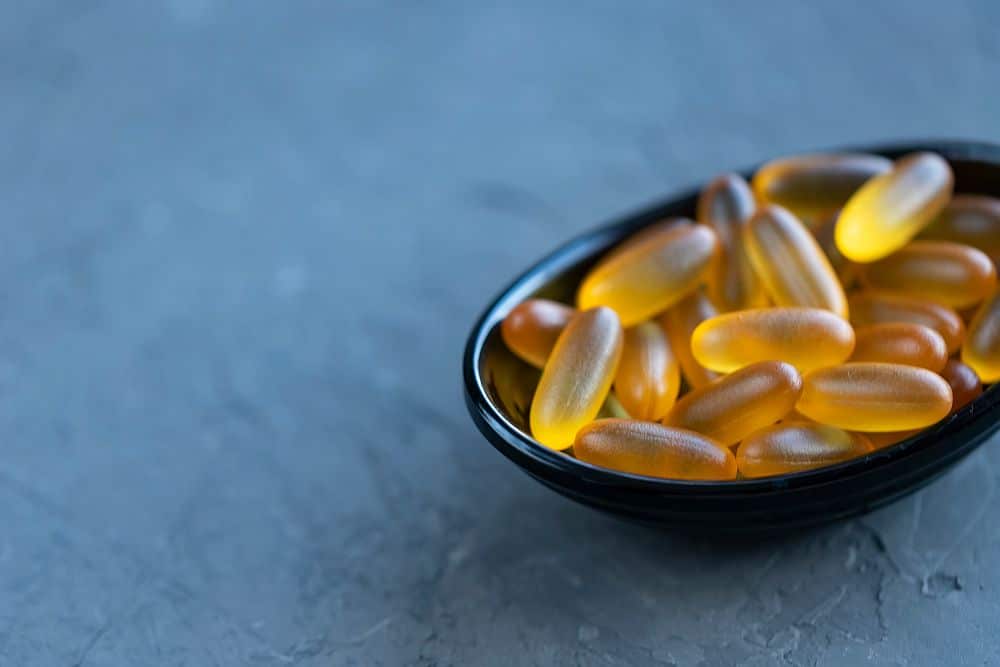OK, a little more detail... Good news: there's usually nothing wrong with the fish oil pill Bad news: it's usually because of what you ate I know, not what you wanted to hear.
 If you've been reading this blog for a while, you know that things aren't quite that simple.
To get to the bottom of it, let's quickly take a look at what enteric coating is.
If you've been reading this blog for a while, you know that things aren't quite that simple.
To get to the bottom of it, let's quickly take a look at what enteric coating is.
What is Enteric Coated Fish Oil?
Enteric coating is a sprayed-on layer on the outside of the fish oil pill's gelatin shell. It's sprayed onto the capsules in a drum sprayer. Think cement mixer. Except, there is a nozzle that sprays the enteric coating material onto thousands of shiny fish oil pills. When all is said and done, the clear pill becomes frosty or translucent. There are a few types of enteric coating materials used to coat fish oil pills. The most popular enteric coating material is methacrylic acid copolymer. It's been used for decades and works very well. But as you probably guessed, it's synthetic. And people don't like putting methacrylic-anything in their bodies. So we use a plant-based cellulose coating derived from algae to coat OmegaVia. Works pretty well. But it's a little tricker and a lot more expensive - that's OK, we don't mind.The purpose of enteric coating:
- Prevent fishy burping and repeating. This is the #1 complaint people have about fish oil and the #1 reason why people stop taking Omega-3 supplements.
- Reduce potential damage to Omega-3 by stomach acids.
How Enteric Coating Works
The material used to enteric coat fish oil supplements is acid-resistant. In plain English, that means the capsule will not dissolve in an acid environment. Like your stomach. Stomach acid is much more powerful than lime juice. The acid helps with digestion and with disinfecting food. A regular fish oil pill that is NOT enteric coated will dissolve in the stomach in about 15 to 20 minutes. Once the pill dissolves, the oil can rise to the surface and possibly cause burping. Since enteric coating will not dissolve in acidic environments, it stays put. It will not dissolve in the stomach. If it doesn't dissolve, you cannot burp up oil or possibly damage the Omega-3. Enteric coated pills will simply move along untouched past the stomach to the small intestine. The duodenum or small intestine is not acidic. It is neutral. Stomach acids are neutralized at the entrance of the small intestines. In the 'safe' environment of the small intestines, the enteric coating quickly dissolves. Within minutes. At this point, the oil is too far down the gullet for you to burp it up. Neat trick! We test it too.How Enteric Coating is Tested
The new lot of OmegaVia being manufactured and bottled just got tested. In two steps. Step 1: We put the pills in 'Gastric fluid,' a solution that imitates the acidity of the stomach. We then stir it for 2 hours. It should not dissolve. And it doesn't. Step 2: We take those pills and put them in a solution charmingly called 'intestinal fluid.' Not unlike the goo that splatters at the end of space alien movies. This fluid mimics the environment in the small intestines or duodenum. The pills always fall apart in this space-alien-goo within minutes. This is proof that the enteric coating works.Weasel Alert!
Sometimes, enteric coating is used to cover up old, rancid fish oil. Yes - gasp! - there are weasels out there. That's not why we enteric coat our fish oil. It's just our formula. We enteric coat. Always. Even if the oil smells fresh like a spring meadow!Three Reasons Why Enteric Coatings Fail
- Lousy paint job. Like your walls or your car, enteric coating is spray-painted onto the capsules. It's a science and an art. Sometimes, there can be a chip or a crack in the enteric coating. This makes the coating useless. Fortunately, this does not happen 99.9% of the time. End result: burping.
- Antacids. Think TUMS, Mylanta, Maalox, or Alka-Seltzer. Products like these may provide relief. But it also makes the stomach more like the small intestines. So what happens when you take enteric coated fish oil with TUMS? The enteric coating 'thinks' it has reached your small intestines and it dissolves. But it's not! It's still in the stomach. End result: burping.
- Heartburn medications. There is a class of drugs called Proton Pump Inhibitors (keeping with the space alien theme today.) Think Prilosec, Prevacid and Nexium. These drugs reduce acid production in the stomach. They may temporarily make life more bearable. But like TUMS, it makes your stomach less acidic. End result: enteric coating dissolves too soon and you may burp up fish oil.
- Infection - H. pylori infections are common and can reduce stomach acidity.
- Stress
- Vegan diet
- Inappropriate (Standard American Diet) diet



